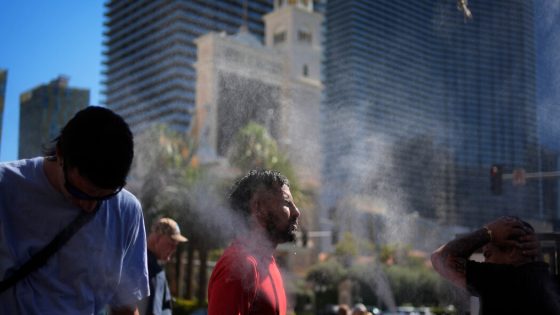A blistering heat wave is believed to have killed four people in the Portland, Ore., area, officials said on Monday, and is expected to push temperatures into the triple digits this week across the Western United States, from Washington to Arizona.
The medical examiner’s office in Multnomah County, Ore., which includes Portland, said that heat was suspected in three deaths in the county between Friday and Sunday, after record temperatures scorched the region. A fourth person, who was transported to a Portland hospital from outside the county, also died from an illness that was believed to be heat-related.
The heat wave was expected to bring more sweltering weather to the southern parts of Arizona, Nevada and California, and daily temperatures were expected to rise to well above 110 degrees. The stifling conditions were expected to last through the workweek, according to the National Weather Service, and temperatures could run 15 to 30 degrees above average in some parts.
The heat wave has already shattered records across interior California and in Las Vegas. In Death Valley, Calif., temperatures reached 127 degrees on Friday, a record for the date, and then 128 on Saturday and 129 on Sunday. A motorcyclist who was visiting Death Valley National Park died from heat exposure on Saturday, and another was treated for severe heat illness.
Few details were released on Monday about the deaths in the Portland area. The four victims, all men, were in separate locations, according to Multnomah County — one was found on Friday, and two were found on Sunday. Portland set new daily records each of the last three days, reaching 100 degrees on Sunday, 20 degrees hotter than the average for the date.
The temperature in Palm Springs, Calif., reached 124 degrees on Friday, the highest ever recorded there. Las Vegas also broke a heat record when the temperature there climbed to 120 degrees on Sunday. Records were also broken in Oregon and in other parts of California.
Many residents of Palm Springs and Las Vegas are used to searing heat in the summertime. In Palm Springs at the Demuth Community Center, where people can find water, snacks and air-conditioning, the number of visitors has not increased noticeably since last week, said Janice Lopez, the supervisor at the center.
“The only thing that we did do was open on Sunday, since we’re kind of in a heat wave, constantly being over 120 degrees,” she said, noting that the center was usually closed on weekends.
The heat wave is forecast to expand from California and Oregon north to Washington and east over the Great Basin and Arizona on Tuesday and Wednesday.
Soaring temperatures will continue to pose a danger to people who are vulnerable or who lack access to cool shelter and electricity, according to Bryan Jackson, a meteorologist with the Weather Service’s Weather Prediction Center in College Park, Md.
“But the heat is high enough out West that it is really not just the vulnerable population,” he said. “It’s dangerous to everyone.”
As humans continue adding greenhouse gases to the atmosphere by burning fossil fuels, experts say, record-breaking heat will become even more common, as will extreme weather events like droughts, wildfires and floods.
Globally, 2023 was the warmest year ever recorded, and the planet has set new monthly records for heat in each of the past 12 months.
In the inland regions of California, millions of residents are waiting for relief as an unusually long heat wave has kept temperatures well above 100 degrees for the past week. Redding, in Northern California, reached 119 degrees on Saturday, setting a new high temperature mark for any date in recorded history.
Officials in Western states also warned that the extreme heat, when coupled with high winds, could propel new wildfires. In the mountains of Santa Barbara County, Calif., the Lake fire exploded over the weekend and consumed more than 20,000 acres, threatening the former Neverland Ranch that was once owned by Michael Jackson and other properties. In less than three days, it has become the state’s largest wildfire so far this year.
Sweltering conditions were not limited to the West. A separate high-pressure system in the East has broken daily heat records in Raleigh, N.C., and other areas.
The two heat waves — and the space between them — are also affecting the path of Beryl, which was downgraded Monday morning to tropical storm from a Category 1 hurricane, though it still delivered damaging winds and rainfall to Texas.
A trough between the high pressure areas is drawing the tropical storm north and through the center of the country, said Mr. Jackson, the meteorologist.
In recent years, global warming has been making heat waves hotter, longer and more frequent. Last year was the warmest on record, and global temperatures have continued to break monthly records in many places this year.
As of Monday morning, more than 141 million people across the United States, about four-tenths of the nation’s population, were under extreme heat advisories, watches or warnings, according to the Weather Service.
Yan Zhuang and Judson Jones contributed reporting.
Source Agencies




